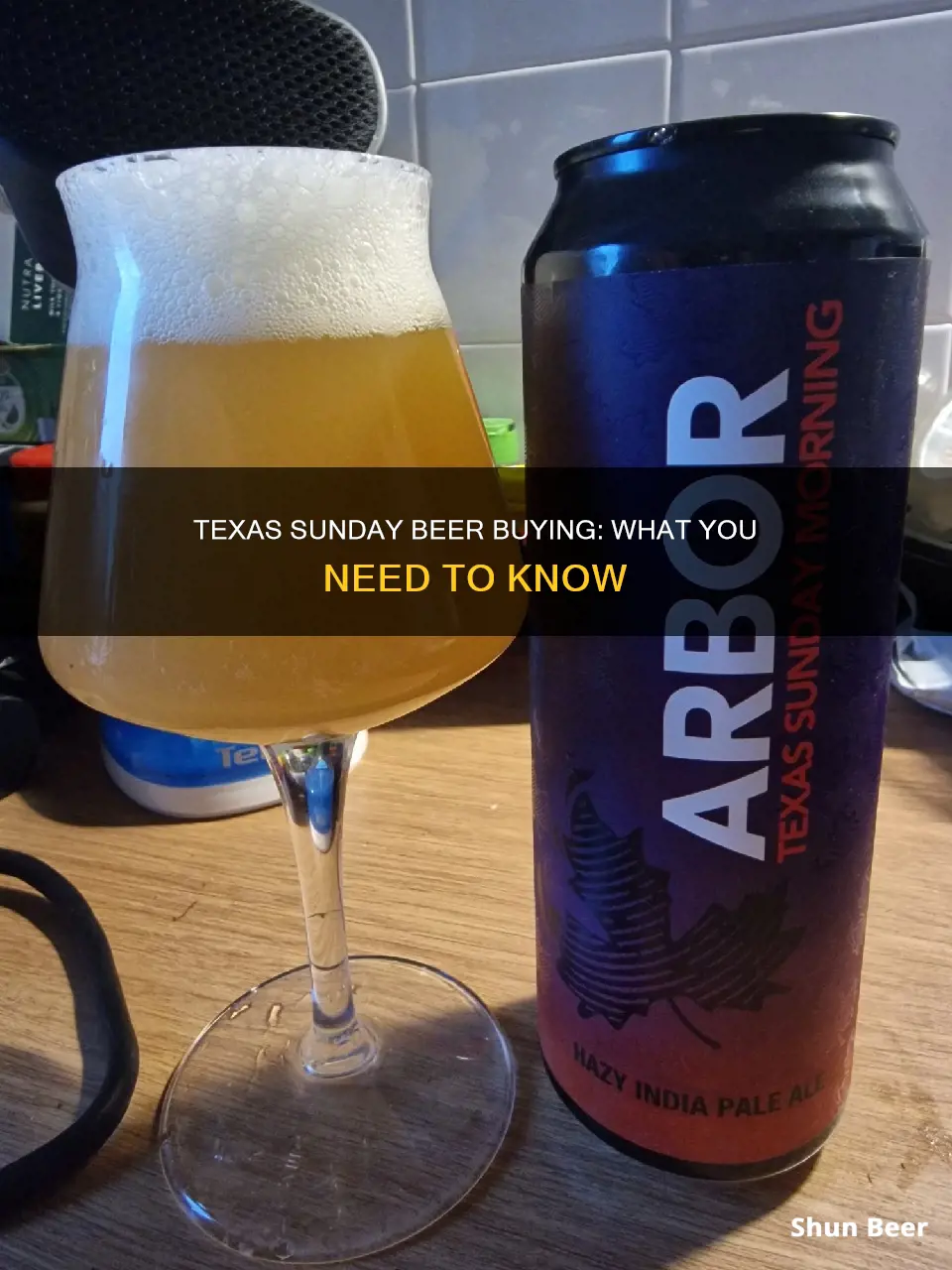
Texas has some of the most restrictive alcohol laws in the United States, and it can be tricky to know when and where you can buy alcohol. These laws are regulated by the Texas Alcoholic Beverage Commission and are enforced by the Texas Alcoholic Beverage Commission (TABC). In this article, we will explore the ins and outs of purchasing beer in Texas on a Sunday, including the specific times and locations that beer can be bought.
What You'll Learn

Beer and wine can be purchased from 10 a.m. on Sundays
Texas has complex liquor laws that can be tricky to navigate. Beer and wine can be purchased from 10 am on Sundays, but this wasn't always the case. In 2021, Texas updated its laws, allowing beer and wine sales to start two hours earlier on Sundays, at 10 am instead of noon. This change provides greater flexibility for those looking to purchase alcoholic beverages on Sundays.
The new law applies to grocery and convenience stores, which can now sell beer and wine from 10 am to midnight on Sundays. It's important to note that these stores are still subject to the same operating hours as before on other days of the week, typically 7 am to midnight, Monday through Friday, and 7 am to 1 am on Saturdays.
Liquor stores, on the other hand, are not permitted to operate on Sundays and must remain closed. This restriction is in line with Texas's stringent regulations aimed at limiting alcohol consumption. Liquor sales are also prohibited on Thanksgiving Day, Christmas Day, and New Year's Day.
The hours during which you can purchase alcohol in Texas vary depending on the type of beverage and the day of the week. For liquor, sales are allowed from 10 am to 9 pm, Monday through Saturday. Beer and wine have extended hours in some locations, with sales permitted until 1 am on Saturdays and from 10 am to midnight on Sundays.
It's worth noting that Texas's alcohol laws have evolved over time to meet the needs and sensibilities of its residents. The state's first "Blue Laws," which prohibited alcohol sales, were enacted in 1935, two years after the end of federal Prohibition. While many of these laws have since been repealed, restrictions on alcohol and automobile sales remain in place.
Where to Buy Wells Banana Bread Beer?
You may want to see also

Liquor sales are prohibited on Sundays
Texas has a set of laws known as "blue laws" that prohibit the sale of liquor on Sundays, Thanksgiving Day, Christmas Day, and New Year's Day. These laws also impose additional restrictions on the sale of beer and wine. While the blue laws have evolved over time, the prohibition on Sunday liquor sales remains in place, reflecting the state's long-standing traditions and cultural heritage.
The Texas Alcoholic Beverage Code, found in Chapter 105, outlines the specific restrictions on liquor sales. Liquor stores are required to remain closed on Sundays, while beer and wine can be purchased from grocery and convenience stores during limited hours on this day. This distinction in the law highlights the stricter regulations surrounding liquor sales in Texas.
The history of Texas blue laws dates back to the 17th and 18th centuries, when similar laws were enacted in some American colonies. The original intent of these laws was to protect Sunday as a day of worship by limiting secular and commercial activities. Over time, the specific restrictions have evolved, and many of the original blue laws have been repealed. However, the prohibition on Sunday liquor sales has persisted, and it continues to be a topic of debate in the state.
The current Texas blue laws regarding alcohol sales present a contrast between the flexibility offered for beer and wine purchases and the stringent regulations for liquor. While consumers can purchase beer and wine during extended hours on Sundays, liquor sales remain prohibited. This discrepancy underscores the state's focus on curbing the consumption of harder alcoholic beverages.
The prohibition on Sunday liquor sales in Texas is a notable aspect of the state's complex liquor laws. While Texans can enjoy the convenience of buying beer and wine during specific hours on Sundays, liquor remains off-limits on this day. This distinction is an important consideration for residents and visitors alike, shaping their drinking habits and influencing their choices when it comes to alcohol consumption.
Beer at Gas Stations in North Carolina: What's Allowed?
You may want to see also

Bars and restaurants can serve alcohol from noon on Sundays
Texas has a set of laws known as "blue laws" that prohibit the sale of liquor on Sundays, Thanksgiving Day, Christmas Day, and New Year's Day. These laws also impose additional restrictions on the sale of beer and wine. Beer and wine can be purchased from 10:00 am to midnight on Sundays, but there are different rules for bars and restaurants.
Bars and restaurants in Texas are permitted to serve alcohol from noon on Sundays, but there is an exception to this rule. If you order food alongside your drink, alcohol service can begin at 10 am. This is in line with the general Sunday serving times at bars and restaurants in the state. However, there are some exceptions to this rule for specific establishments and events.
For instance, hotel bars can serve alcohol to their guests at any time of day. Additionally, during live events at sports venues, festivals, fairs, or concerts, alcohol service can also start at 10 am, regardless of whether food is served. Certain bars and restaurants with a "late hours" permit can serve alcohol until 2 am any night of the week.
It is important to note that Texas has complex liquor laws, and the rules may vary depending on the type of establishment, day of the week, and type of alcohol. These laws have evolved over time, reflecting the state's cultural and religious heritage, and the needs of its residents.
Alcohol-Free Beer: UK Age Limit and Legalities Explained
You may want to see also

Alcohol can be served from 10 a.m. on Sundays with food
Texas has strict laws regarding the sale of alcohol, which vary depending on the type of alcohol and the day of the week. These laws are known as "blue laws" and were originally designed to protect Sunday as a day of worship by limiting secular and commercial activities. While many of these laws have been repealed, restrictions on alcohol sales remain in place.
In Texas, grocery and convenience stores can sell beer and wine from 10 a.m. to midnight on Sundays. This is a change from the previous law, which prohibited sales until noon. This means that alcohol can be served from 10 a.m. on Sundays, but only if it is accompanied by food. This rule applies to bars and restaurants as well, which can serve alcohol from 10 a.m. to noon on Sundays, but only with the service of food. If food is not included in the order, alcohol sales at bars and restaurants cannot begin until noon.
The law also differentiates between different types of alcohol. While beer and wine sales are permitted from 10 a.m. on Sundays, liquor sales are prohibited. Liquor stores must remain closed on Sundays, reflecting stringent regulations aimed at limiting alcohol consumption. This is in line with restrictions on other days of the week, as liquor sales are also prohibited on Thanksgiving Day, Christmas Day, and New Year's Day.
The hours during which alcohol can be purchased in Texas vary throughout the week. From Monday to Friday, liquor sales in stores are permitted from 10 a.m. to 9 p.m. On Saturdays, liquor sales are allowed during the same hours, while beer and wine sales are extended until 1 a.m. on Sunday morning. On Sundays, beer and wine can be purchased from 10 a.m. to midnight, but liquor sales remain prohibited.
It is important to note that these laws can be complex and may vary in different counties or municipalities within Texas. Additionally, certain establishments, such as hotels, may have special permits that allow them to serve alcohol during extended hours.
Everest Beer: Where to Buy and Enjoy the Taste
You may want to see also

Wineries can serve alcohol from 10 a.m. to midnight on Sundays
Texas has a set of laws known as "blue laws", which prohibit the sale of liquor on Sundays, Thanksgiving Day, Christmas Day, and New Year's Day. These laws also impose additional restrictions on the sale of beer and wine. Beer and wine can be purchased from grocery and convenience stores from 10 am to midnight on Sundays. Wineries, which are usually a mix of on- and off-premises sales, can serve alcohol from 10 am to midnight on Sundays.
Wineries in Texas are allowed to serve alcohol during specific hours, which are 10 am to midnight on Sundays. This is part of the state's regulations on alcohol sales, which aim to maintain community standards and values while also providing some flexibility for businesses and consumers.
The hours for wineries fall within the broader framework of alcohol sales in Texas. For example, beer and wine sales in retail stores that don't sell liquor are permitted from 7 am to midnight, Monday through Friday, and from 7 am on Saturday to 1 am on Sunday. Liquor stores, on the other hand, are subject to more stringent regulations and are closed on Sundays, as well as on Thanksgiving, Christmas, and New Year's Day.
The Texas Alcoholic Beverage Commission (TABC) is responsible for enforcing these laws and ensuring compliance among businesses. The TABC also provides resources and guidance to businesses and consumers regarding alcohol sales and consumption.
It's worth noting that Texas's alcohol laws can be complex due to their long history and the involvement of multiple regulatory levels. The state's "blue laws" date back to the 17th and 18th centuries and were originally designed to protect Sunday as a day of worship by limiting commercial activities. While many of these laws have been repealed, the restrictions on alcohol and automobile sales remain in place.
Surly Beer: Where to Buy and What to Know
You may want to see also
Frequently asked questions
You can buy beer from 10 a.m. to midnight on Sundays in Texas.
You can buy beer from grocery and convenience stores on Sundays in Texas.
Yes, you can buy beer from 10 a.m. on Sundays in Texas.
No, beer sales in Texas end at midnight on Sundays.
Yes, bars and restaurants can serve alcohol from 10 a.m. to noon on Sundays, but only if paired with food. If food isn't included in the order, alcohol-only sales begin at noon.







